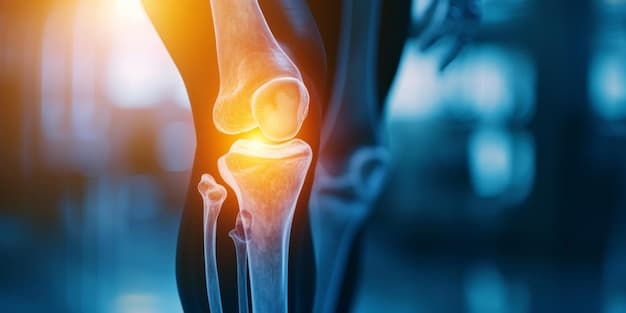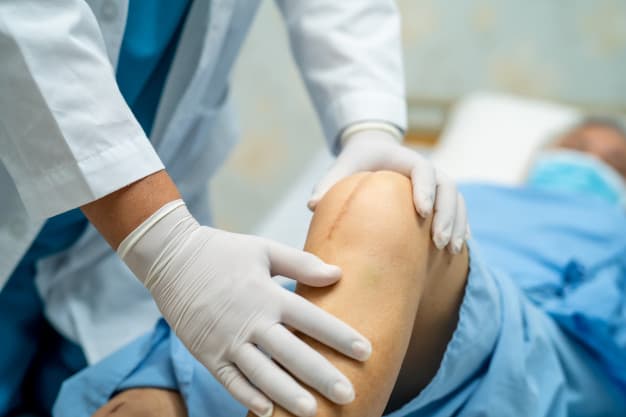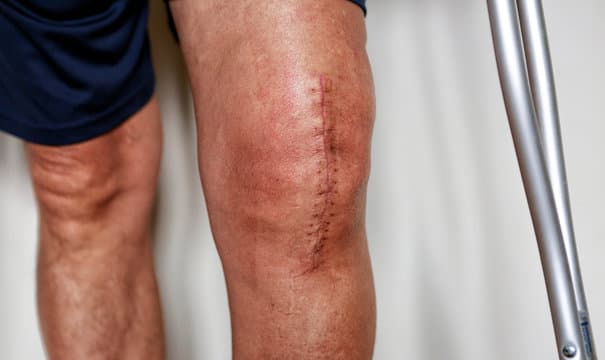Recovering from a knee replacement surgery requires careful adherence to post-operative guidelines to ensure successful healing and optimal outcomes. Unfortunately, several common mistakes can hinder this recovery process and potentially lead to complications.
Mistakes after a knee replacement
Recovering from knee replacement surgery requires careful attention to post-operative guidelines, but common mistakes can jeopardize the healing process. One significant error is not adhering to the prescribed physical therapy regimen, which is essential for regaining strength and mobility in the knee. Skipping medications or not taking them as directed can also hinder recovery, as these medications help manage pain and inflammation. Engaging in activities that put undue stress on the knee, such as heavy lifting or high-impact sports, can lead to complications and prolong the healing period. Additionally, neglecting proper wound care can result in infections, further complicating recovery. Another mistake is failing to balance rest with activity; too much rest can lead to stiffness, while too much activity can strain the knee. It's crucial to follow dietary recommendations to support overall health and healing. By avoiding these common pitfalls and closely following your healthcare provider's instructions, you can ensure a smoother and more effective recovery after knee replacement surgery.

What not to do after knee replacement surgery
Recovering from knee replacement surgery requires careful adherence to post-operative guidelines to ensure successful healing and optimal outcomes.
One of the most important things to avoid is ignoring the physical therapy regimen prescribed by your surgeon. Skipping or not fully engaging in physical therapy can lead to stiffness, reduced mobility, and prolonged recovery times.
Additionally, avoiding activities that put undue stress on the new knee is crucial; this includes heavy lifting, running, jumping, and any high-impact sports that can strain or damage the implant.
Another common mistake is failing to manage pain and inflammation effectively. It's essential to take medications as directed to control pain and reduce swelling, which can otherwise impede healing and increase discomfort.
Proper wound care is also vital to prevent infections. Keeping the incision clean and dry, following your doctor's instructions for bandage changes, and watching for signs of infection like redness, swelling, or unusual discharge are essential steps. Neglecting these can result in serious complications requiring additional medical attention.
Additionally, while it's important to stay active to prevent blood clots and maintain mobility, overexertion and excessive activity can cause setbacks. Striking a balance between rest and gentle movement is key.
Dietary considerations should not be overlooked either. Maintaining a healthy diet rich in vitamins and minerals supports overall healing and bone health. Avoiding smoking and excessive alcohol consumption is also important, as these can negatively affect recovery and increase the risk of complications.
Finally, it's crucial to follow all post-operative instructions provided by your healthcare team. These instructions are tailored to your specific situation and are designed to facilitate a smooth recovery.
Failing to comply with these guidelines can significantly hinder your progress and lead to further issues.

Knee replacement exercises to avoid
After knee replacement surgery, it is essential to avoid certain exercises that could hinder your recovery or cause damage to the new joint. High-impact activities are particularly risky.
Exercises such as running, jogging, jumping, and high-intensity aerobics place significant stress on the knee joint, increasing the likelihood of loosening the implant or causing other complications. Activities that involve abrupt, twisting motions or rapid changes in direction, such as basketball, soccer, and tennis, should also be avoided during the recovery period. These movements can strain the new joint and potentially lead to injury.
Weightlifting exercises that put excessive pressure on the knee, such as deep squats, lunges, and leg presses, can be harmful as well. These activities can place undue stress on the knee joint and surrounding muscles, leading to discomfort or damage. Instead, opt for low-impact strength training exercises that can help build muscle without overloading the knee.
Additionally, avoid exercises that require prolonged kneeling or squatting. These positions can be uncomfortable and may place additional strain on the knee joint. Certain yoga poses and stretching routines that involve deep knee bends or hyperextension should also be modified or avoided to prevent injury.
Swimming and cycling are generally safe, low-impact alternatives that can help maintain cardiovascular health and muscle strength without stressing the knee. Walking is also an excellent exercise, but it should be done on flat, even surfaces to avoid unnecessary strain.
Always follow the guidance of your healthcare provider or physical therapist regarding your exercise regimen after knee replacement surgery. They can provide personalized recommendations and ensure that your exercise routine supports a safe and effective recovery. By avoiding high-impact and stress-inducing activities, you can protect your new knee joint and promote long-term success and mobility.

What to do after a knee replacement
After knee replacement surgery, following a structured post-operative care plan is crucial for a successful recovery.
Begin by adhering strictly to your physical therapy regimen, as guided by your healthcare provider. Physical therapy is designed to improve strength, flexibility, and range of motion in your new knee, essential for regaining normal function and mobility. Regularly attending therapy sessions and performing prescribed exercises at home will expedite recovery and help prevent complications.
Pain management is another critical aspect. Take prescribed medications as directed to control pain and reduce inflammation, which can significantly impact your ability to participate in rehabilitation activities. Ice packs can also help alleviate swelling and discomfort in the early stages of recovery.
It's important to keep the surgical site clean and dry to prevent infection. Follow your surgeon’s instructions on wound care, including when and how to change dressings. Be alert for signs of infection, such as increased redness, swelling, warmth, or discharge, and report any concerns to your healthcare provider promptly.
Maintaining a balanced diet rich in vitamins and minerals is beneficial for healing. Nutrients such as protein, vitamin C, and zinc support tissue repair and recovery. Staying hydrated is equally important to promote overall well-being and healing.
Gradually increase your activity levels as advised by your healthcare team. Begin with gentle activities like walking on flat surfaces, which helps improve circulation and prevents blood clots. Avoid high-impact activities and heavy lifting to protect your new knee.
Following post-operative guidelines diligently, including wearing any prescribed compression stockings or braces, can aid in reducing swelling and providing necessary support. Additionally, avoid smoking and excessive alcohol consumption, as these can impede the healing process.
Finally, keep all follow-up appointments with your surgeon to monitor your progress and address any issues that arise.

Conclusion
In conclusion, avoiding common mistakes after knee replacement surgery is essential for a smooth and effective recovery. Key errors to avoid include neglecting the prescribed physical therapy regimen, which is crucial for regaining mobility and strength, and engaging in activities that place undue stress on the new joint, such as high-impact exercises or heavy lifting. Proper wound care, effective pain management, and maintaining a balance between rest and gentle activity are also vital to prevent complications and promote healing. By adhering closely to your healthcare provider's post-operative instructions and being mindful of these potential pitfalls, you can ensure a more successful recovery and achieve the best possible outcomes for your knee replacement surgery.
Read More